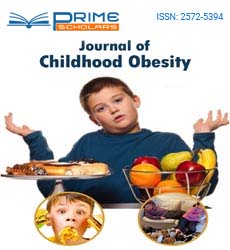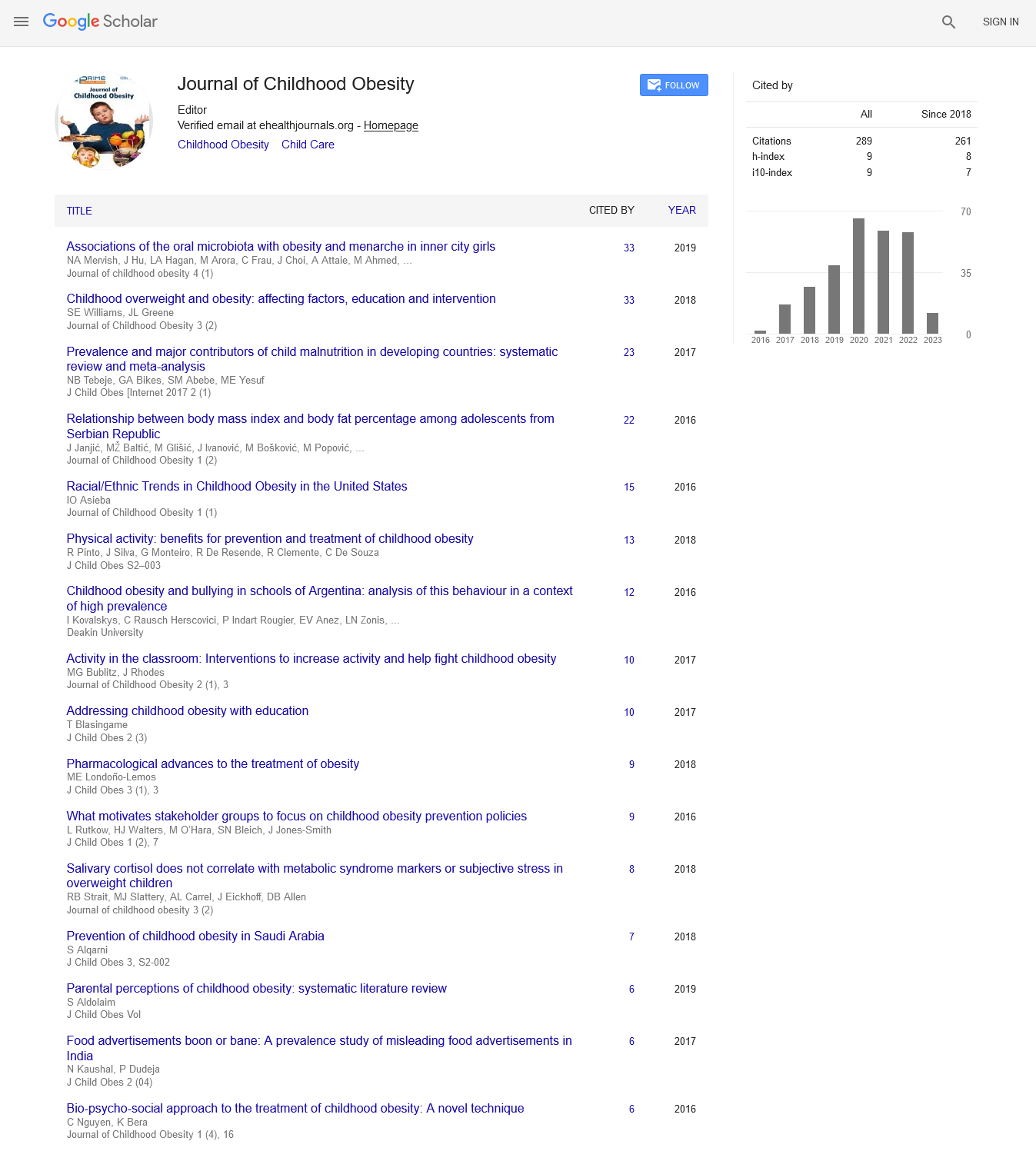Short Communication - (2021) Volume 0, Issue 0
Risk Factors and Clinical Implications of Childhood Obesity
Padmapriya Jani*
Department of Human Development and Family Studies, Maharana Pratap University of Agriculture and Technology, Udaipur, Rajasthan, India
*Correspondence:
Padmapriya Jani, Department of Human Development and Family Studies, Maharana Pratap University of Agriculture and Technology,
India,
Email:
Received: 01-Nov-2021
Published:
22-Nov-2021
Introduction
Childhood weight problems have reached epidemic tiers in
advanced in addition to in growing countries. Overweight and
weight problems in adolescence are acknowledged to have
tremendous effect on each bodily and mental health. Overweight
and overweight kids are possibly to live overweight into maturity
and much more likely to expand non-communicable sicknesses
like diabetes and cardiovascular sicknesses at a more youthful age.
The mechanism of weight problems improvement isn't always
absolutely understood and its miles believed to be a sickness
with more than one causes. Environmental factors, way of life
preferences and cultural surroundings play pivotal roles with
inside the growing incidence of weight problems worldwide. In
general, obese and weight problems are assumed to be the effects
of a boom in caloric and fats consumption. On the alternative
hand, there is helping proof that immoderate sugar consumption
through gentle drink, accelerated component size, and regular
decline in bodily hobby had been gambling primary roles with
inside the growing prices of weight problems everywhere in the
world [1]. Childhood weight problems can profoundly have an
effect on kids’ bodily health, social, and emotional well-being,
and self-esteem. It is likewise related to bad educational overall
performance and a decrease high-satisfactory of existence skilled
through the child. Many co-morbid situations like metabolic,
cardiovascular, orthopedic, neurological, hepatic, pulmonary,
and renal issues also are visible in affiliation with adolescence
weight problems [1].
Childhood weight problems are a severe clinical situation that
impacts youngsters and adolescents. It`s especially troubling
due to the fact the more kilos frequently begin youngsters at
the route to fitness issues that have been as soon as taken into
consideration person issues — diabetes, excessive blood stress
and excessive cholesterol. Childhood weight problems also can
result in negative vanity and depression [2].
One of the great techniques to lessen early life weight problems
is to enhance the ingesting and workout behavior of your whole
family. Treating and stopping early life weight problems enables
shield your kid's fitness now and with inside the future [2].
Risk Factors
Many factors, generally acting in combination, increase the risk
of overweight in children:
The Diet: Regular consumption of high-calorie foods such as fast
food, pastries, and vending machine snacks can make your child gain weight. Candies and desserts can also cause weight gain,
and there is growing evidence that sugary drinks, including fruit
juices and sports drinks are a cause of obesity in some people [3].
Lack of Exercise: Children who exercise less are more likely to
gain weight because they do not burn as many calories. Spending
too much time on sedentary activities, such as watching TV or
playing video games, also exacerbates the problem. Junk food
commercials also appear frequently on TV programs.
Family factor Children are more likely to gain weight if they
were born into an overweight family. This is especially true in
environments where high-calorie foods are always served and
physical activity is not encouraged.
Psychological Factors: Stress from individuals, parents, and
families can increase the risk of obesity in children. Some children
overeat to cope with problems or to deal with emotions such as
stress or boredom. Their parents may have a similar tendency
[3].
Socio-economic factors: People in some communities have
limited resources and limited access to supermarkets. As a result,
you can buy processed foods that don't spoil quickly, such as
frozen foods, crackers and cookies. Also, people living in lowincome
areas may not have access to safe places to exercise
[3].
Certain medicines: Some prescription drugs may increase your
risk of developing obesity. These include prednisolone, lithium,
amitriptyline, paroxetine (Paxil), gabapentin (Neurontin, Graris,
Horisant) and propranolol (Inderal, Hemangal).
REFERENCES
- Sahoo K, Sahoo B, Choudhury AK, Sofi NY, Kumar R, et al. (2015) Childhood obesity: causes and consequences.
- Ko YJ, Kim J (2021) Effect of exercise immersion experience on health promotion and lifelong physical education of high school students in sports club activities. J Exerc Rehabil 17:169-74.
- https://www.mayoclinic.org/diseases-conditions/childhood-obesity/symptoms-causes/syc-20354827
Citation: Jani P (2021) Risk Factors and Clinical Implications of Childhood Obesity. J Child Obes. 2021, S5:2
Copyright: © 2021 Jani P. This is an open-access article distributed under the terms of the Creative Commons Attribution License, which permits unrestricted use, distribution, and reproduction in any medium, provided the original author and source are credited.
Competing interests: The authors have declared that no competing interests exist.

